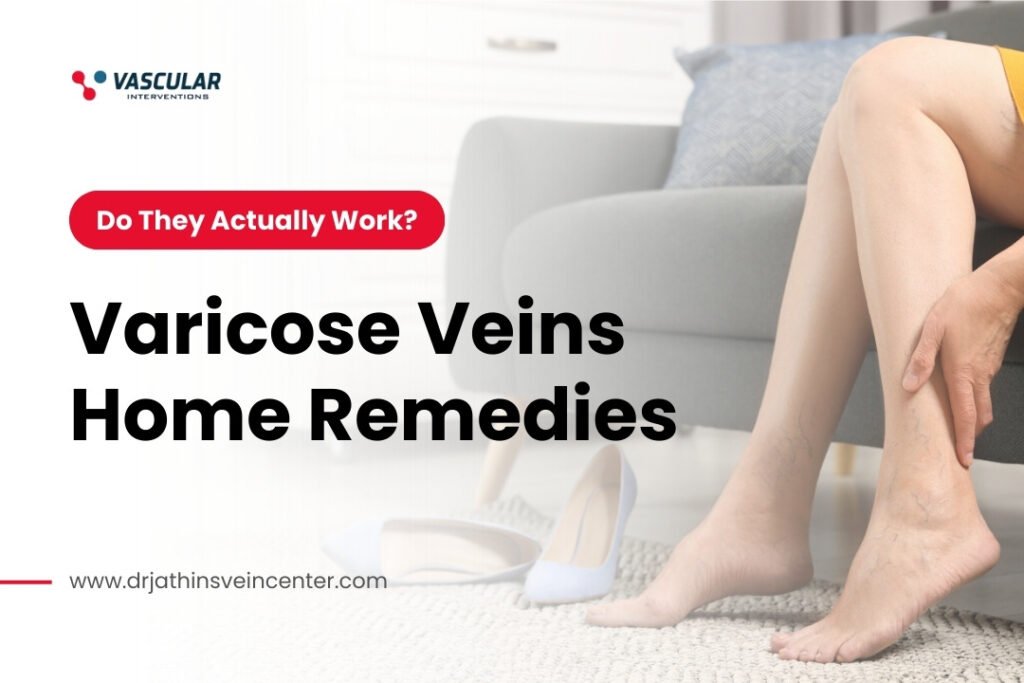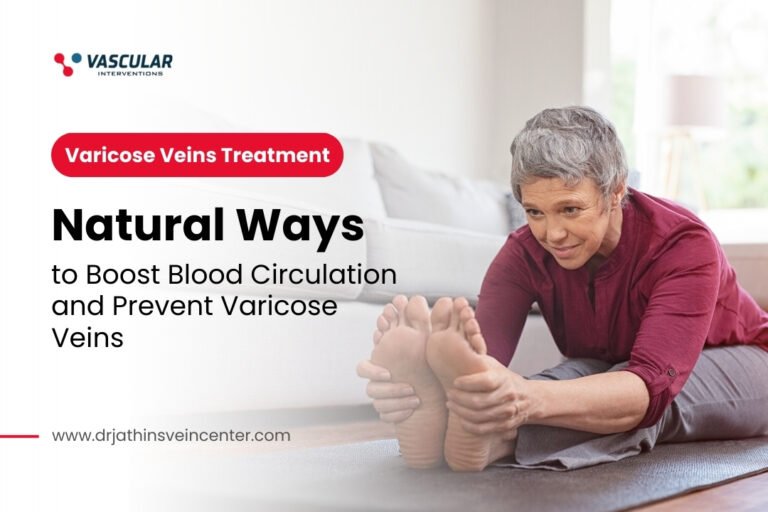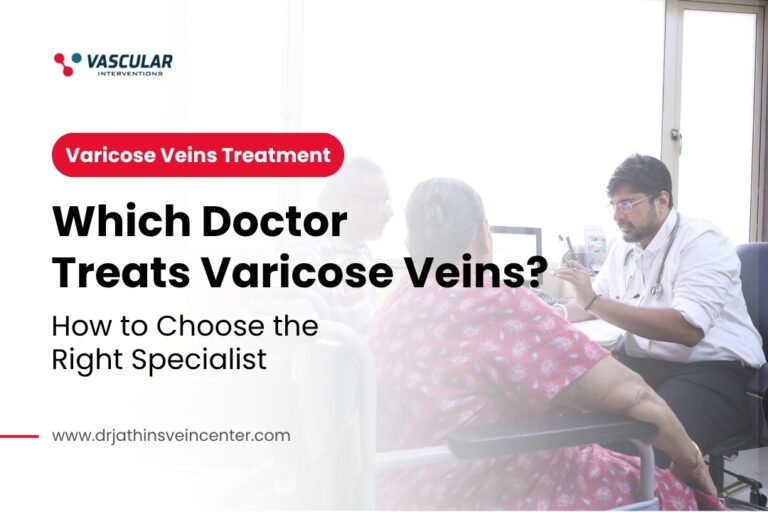Dealing with varicose veins can be both frustrating and uncomfortable. These twisted, swollen veins often appear on the legs and can cause pain, heaviness, and sometimes even more severe complications if left untreated.
You might be wondering if there are ways to manage this condition from the comfort of your home.
In this blog post, we’ll explore the most popular home remedies for varicose veins. Many people turn to these natural and accessible methods in hopes of finding relief.
But you might ask, do these remedies actually work?
We’ll dive into the most popular home remedies for varicose veins that people use, and examine their effectiveness with insights from Dr. Jathin, one of the best varicose veins doctors in Mumbai. This will help you understand when it’s time to seek professional help.
Our goal is to provide you with clear, reliable information so you can make informed decisions about managing varicose veins. Let’s start by understanding what varicose veins are and why they develop.
Understanding Varicose Veins
Before diving into home remedies, it’s important to understand what varicose veins are and why they develop.
What are Varicose Veins?
Varicose veins are enlarged, twisted veins, usually appearing on your legs and feet. They occur when the valves in your veins that regulate blood flow become weak or damaged, causing blood to pool and veins to swell.
Common Symptoms
- Visible, swollen veins
- Pain, heaviness, or discomfort
- Swelling in legs and ankles
- Skin changes around the affected area
Common Causes
- Aging
- Hormonal changes in women
- Genetic predisposition
- Obesity
- Prolonged standing or sitting
Why People Seek Home Remedies
Many people turn to home remedies because they are natural, cost-effective, and convenient.
These remedies offer a way to manage symptoms from the comfort of your home. However, it’s important to know their limitations and when to seek professional help.
Now, let’s explore popular home remedies and their effectiveness.
Popular Home Remedies for Varicose Veins
There are several home remedies that people commonly use to manage the symptoms of varicose veins.
Let’s take a closer look at some of the most popular ones and how they might help.
1. Exercise
Regular exercise improves blood circulation in your legs, which helps push along the blood that has collected in the veins.
Simple exercises like:
- Walking
- Cycling
- Swimming
Are particularly beneficial. Even a few minutes a day can make a difference.
2. Dietary Changes
Eating a healthy diet can aid in weight management, reducing pressure on your veins.
Focus on high-fiber foods (to prevent constipation, which can exacerbate varicose veins) and potassium-rich foods (to reduce water retention).
Examples include:
- Fruits
- Vegetables
- Whole grains
- Legumes
For more information, check out our blog post on healthy food for Varicose Veins.
3. Reduce Salt Intake
Lowering your salt intake can help reduce water retention and swelling, which can alleviate pressure on your veins.
Opt for fresh, unprocessed foods to naturally reduce your salt consumption.
4. Lose Weight
Maintaining a healthy weight relieves excess pressure on your veins. Weight loss can improve overall circulation and reduce the severity of varicose veins.
However, avoid extreme exercise to lose weight quickly, as it can worsen varicose veins. Opt for moderate, low-impact exercises that we explored in the above point.
5. Herbal Remedies
Certain herbs are believed to improve vein health and reduce varicose veins.
For example:
Horse chestnut: Commonly used to decrease leg swelling and discomfort. (Source)
Butcher’s broom: Often used to improve blood circulation and reduce inflammation. (Source)
Grape Seed Extract: According to the National Center for Complementary and Integrative Health, grape seed extract may improve circulation and reduce swelling.
These herbs can be found in supplement form but should be used with caution and ideally under the guidance of a healthcare professional.
6. Essential Oils
Some people use essential oils like lavender, rosemary, and cypress to massage the affected areas.
These oils can improve circulation and reduce swelling when used correctly. A study published in 2012 found that certain essential oils can significantly improve blood flow and reduce symptoms of chronic venous insufficiency.
But, You must dilute essential oils with a carrier oil before applying to the skin to ensure safety and effectiveness.
7. Compression Stockings
Compression stockings are designed to squeeze your legs, helping veins and leg muscles move blood more efficiently.
They can be particularly effective if you have to stand for long periods. For more detailed information, check out our blog post on Compression Stockings for Varicose Veins.
8. Elevating Legs
Elevating your legs can help reduce the pressure in your leg veins and improve blood flow back to your heart.
Aim to elevate your legs above heart level for 15 minutes several times a day.
This simple practice can alleviate swelling and discomfort, especially after long periods of standing or sitting.
You can easily incorporate leg elevation into your daily routine, such as while reading, watching TV, or even during short breaks at work, to promote better circulation and vein health.
9. Massage
Gentle massage can help improve blood circulation in your legs. Use upward strokes towards the heart, and avoid putting pressure directly on the varicose veins.
Combining massage with essential oils can enhance the benefits. Remember to dilute essential oils with a carrier oil before applying to the skin to ensure safety and effectiveness.
Effectiveness of Home Remedies
Many individuals report relief from varicose vein symptoms through these home remedies. Personal experiences often highlight the comfort and accessibility of these methods.
However, it’s important to recognize that personal experience is subjective and can vary widely among individuals.
Limitations and Risks of Relying Solely on Home Remedies
While home remedies can provide relief and support vein health, they have limitations:
- Temporary Relief: Most home remedies offer temporary symptom relief rather than addressing the underlying issue.
- Varied Effectiveness: The effectiveness of home remedies can vary significantly from person to person.
- Potential Risks: Misuse of herbal supplements and essential oils, or engaging in extreme exercise routines, can potentially worsen symptoms or cause adverse effects.
Insights from Dr. Jathin – Varicose Veins Expert
As you already know home remedies can offer temporary relief and support overall vein health, they are not a substitute for professional medical treatment.
Dr. Jathin, one of the best varicose veins doctors in Mumbai, emphasizes the importance of a comprehensive approach to managing varicose veins. Home remedies can be a valuable part of your routine, but they should complement professional care rather than replace it.
If you experience severe pain, significant swelling, skin changes, or if home remedies do not provide sufficient relief, it’s crucial to seek professional help.
Signs that indicate the need for medical intervention include persistent discomfort, skin ulcers, and any signs of infection. Proper Varicose Veins treatments can address the underlying issues more effectively and prevent complications in future.
At Dr. Jathin’s Varicose Veins Center, we offer a range of advanced varicose veins treatments tailored to your specific needs. Our goal is to provide you with the most effective and least invasive options available, ensuring optimal results and a better quality of life.
If you are struggling with varicose veins and looking for expert care, don’t hesitate to reach out to us. Contact us today to schedule a consultation and explore the best treatment options for you.





